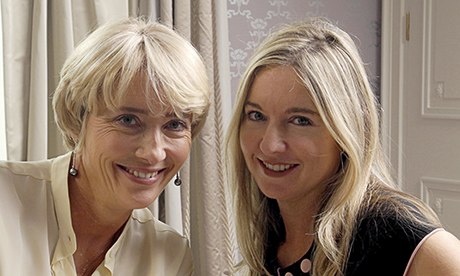
Oh dear. Mary Poppins and video games today, neither of which have really played any meaningful part in my life. Still, I suppose if anyone can get me into either, then Victoria Coren Mitchell and Charlie Brooker can. Guess who's on which. Brooker on Poppins – ha, that would have been interesting. Chim Chimney ...
The Secret Life of Mary Poppins: a Culture Show Special (BBC2, Saturday) is actually the secret life of her creator, PL Travers. Victoria Coren Mitchell – bossy and stern, clipped, strict and ultimately mysterious – flies in on an east wind, to the Kent cottage where Travers lived. She sits where Travers sat, looks out of the window and in the mirror, of course, though sadly doesn't slide up the bannisters. But she does talk of the magic in the Mary Poppins books that so enchanted her when she read them as a child; also the darkness, fear and sadness they had, which Walt Disney would later wipe away with a white glove, a Hollywood smile and a song. Travers herself hated the film, the songs and the animation and the sentimentality, though it did make her very rich.
VCM drives an old sports car, visits Norland Nannies, meets Travers's granddaughter, and Emma Thompson (who plays Travers in the new Disney film about her). The portrait that emerges is a fascinating one of a very odd woman. Travers' own childhood was unhappy, her father drank and died young, her mother found it hard to cope and tried to kill herself. Later, she would have unconventional and secretive relationships, with men and women. And adopt a child, a twin, who would find it hard to forgive her when he discovered his life was a lie, and who also became an enthusiastic drinker. Hardly surprising then, that there is darkness and a sadness in her books, that they didn't have the same tidy resolution that Disney gave the film.
Victoria Coren Mitchell is a fabulous guide. A fan, of the books, but also of the person – a strong and single-minded woman, confident in her work, and way ahead of her time in adopting a child as a single woman in her 40s. Not too much of a fan though not to see Travers' battiness and flaws. Or to enjoy the irony that such an imperfect mother, and uncosy grandmother, wrote books about how best to bring up children.
You won't find any of this misery in the new movie, Saving Mr Banks, which once again applies several coats of Disney gloss. VCM sees it, comes out feeling moved, to tears almost, but also cross with herself for being so. She's been had, by a Hollywood that doesn't reflect the real world. "In a way it's like Hollywood itself is a Mary Poppins … it's tidying up the nursery, it's finding a way through the chaos," she says. "We want to believe, as much now as we did in 1964 that redemption is possible, and that is both the lie and the miracle of Hollywood films."
I won't be bothering with Saving Mr Banks. Don't need to now; I have – and am very pleased to have – seen this, a messier reality. Not all mess maybe. PL Travers's adopted son did come to forgive his mother, and love her again. He saw her on the day before she died, sang her a lullaby, the one she used to sing to him when he was a boy. That's resolution and redemption of sorts.
If you're into gaming, then Charlie Brooker's How Video Games Changed the World (Channel 4, Sunday) would have been pretty much heaven. I'm not (I think I may secretly be a woman). Nor am I a fan of the clips 'n' c-words genre of TV, the rent-a-gobs here being games designers, games journalist, a few comedians, Jonathan Ross, Tom Watson MP, and actually quite a lot of women. (So either I'm a sexist for thinking women aren't so into gaming as men, or they found the ONLY five who are.) Plus it's too long. Two hours nearly, a big old trawl through 40 years of gaming history.
It's not just reminiscing about the graphics in Super Mario though, or discussing what kind of a character Pac-Man had (Pac-Man! Character!). Brooker does bring himself along to the party too. So jokes and an arched eyebrow. Interesting ideas too, about how video games have burrowed into our lives, by stealth. Gamification it's called, meaning applying the mechanics of video games to real life. Basically our lives are just big video games now, though I think mine is stuck on Pong.

